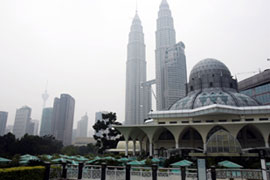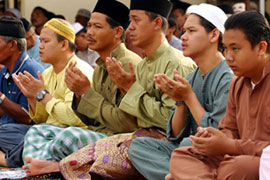Malaysia targets ‘deviance’
Police expected to charge group accused of reviving banned Islamic sect.

 |
| The Malaysian government has invested heavily to project a progressive image of Islam |
Malaysian Islamic police are expected to bring charges this week against 12 members of a registered corporation accused of violating a fatwa, or religious edict, banning the teachings of an allegedly deviant Muslim sect.
The corporation, known as Rufaqa, is accused of reviving the teachings of Al-Arqam, outlawed in 1994 for, among other things, projecting its leader as a messiah who can forgive the sins of Muslims.
Al-Arqam’s leader, 69 year-old Ashaari Mohammed, is also chairman of Rufaqa, but denies using the corporation as a front to revive Al-Arqam.
He says 10 years of house arrest and imprisonment under Malaysia ’s Internal Security Act (ISA) have left him too disillusioned to rekindle the movement.
Under the ISA detainees can be held indefinitely without trial. Ashaari was released after a few months for admitting to authorities that he had led his followers astray and promising to work toward their rehabilitation.
Ashaari’s wife, however, has recently launched a book, titled “Father Ashaari Muhammad–the Most Miraculous Leader in his Time”, which Muslim authorities say contains 36 points that run against the teachings of Islam.
Claims in the book include: that Allah has given Ashaari special powers to attract money; that Ashaari has had private conversations with the Prophet Muhammad; and that the Prophet and Ashaari possess the same level of knowledge and wisdom.
Division
“The legitimate concern of the government is the development of a religion within a religion,” said W. M. Azam, an associate professor at the International Islamic University Malaysia.
Key Facts |
|
AL-ARQAM Al-Arqam founded in 1968 by Ashaari Mohammed, was a mystical Sufi sect Believed to have had 100,000 followers and sympathizers, including government officials Claimed to have assets worth $84 million Al-Arqam was outlawed in 1994 RUFAQA Ashaari founded Rufaqa in 1997 Many Al-Arqam members are said to have joined Rufaqa In Indonesia and Thailand Ashaari’s followers have continued to use the Al-Arqam name Rufaqa is registered as a businesss with the Companies Commission of Malaysia. |
In multi-ethnic and religious Malaysia, the Muslim-led government has long feared that so-called “deviant” sects will cause division among Malay Muslims, who make up 60 per cent of the population.
In one state, Selangor, the Islamic Affairs Department (Jais) says it is keeping close watch on the activities of 23 potentially “deviant” Islamic groups.
According to the government this is to monitor and curb potentially violent minorities within the faith.
While Malaysia bills itself as a model peaceful Islamic state, intelligence agencies say it has been used as a conduit for Jemaah Islamiyah and other groups accused of supporting terrorism.
But some believe the government is tending to interfere too much in matters of faith.
“What is deemed an acceptable interpretation of God and Islam is in the hands of the government,” said Yap Swee Seng, executive director of Suaram, a local rights group.
This has led to the government intervening in what might seem to some as trivial matters of doctrine and ritual. One of the 23 “deviant” groups, for example, has been singled out for teaching that Muslims need only put their finger into a pale of water to be purified after sex.
At other turns the government has been accused of using its authority to restrict religious beliefs to take down political opponents.
With the rise in the late 1990s of the conservative opposition Islamic party PAS, the government restricted distribution and publication of the party’s newspaper and suspended allocation of federal funds to constituencies that elected PAS candidates.
‘Civilizational Islam’
Rufaqa is not a political party. But that does not necessarily prevent the group from posing a political challenge.
UMNO, the Malay party that dominates the ruling coalition, has held onto its position by projecting itself as the sole defender of Islam and the Malay race.
|
|
|
Muslim Malays make up around 60 per |
Toward that end the government requires all Muslim civil servants to attend government-approved religious classes.
In the last elections in 2004, Abdullah Badawi, the prime minister and UMNO leader, scored a sweeping victory on a platform he dubbed “Islam Hadhari” (Civilizational Islam) – a concept which stresses moderation alongside technological and economic competitiveness.
Rufaqa’s stated aim to build an independent and empowered Malay race through Islamic principles and economic advancement is in line with the government’s.
The difference is Rufaqa’s books and DVDs are “selling like hot cakes” at markets and bookstores around the country, according to Fakrul Azam Yahya, spokesman for Jais.
The prime minister Abdullah has urged all of Malaysia’s 13 states to issue fatwas banning Rufaqa’s teachings. Three, including Selangor, Negeri Sembilan and Malacca, have complied.
Like Al-Arqam before it, Rufaqa has attracted a strong following among middle class and educated Malays.
Its businesses include grocery stores, herbal products, arts and crafts, furniture, electronics, publishing and tourism. It claims to employ 5,000 people nationwide and have 700 affiliates stretching from the Middle East to Australia.
Model of development
On weekends the company’s villa in Nilai, where Ashaari is said to reside, reportedly attracts hundreds of Malays from around the country, many driving luxury cars.
“In terms of business and the performing arts and other fields, [Rufaqa] has become a model of development to the Muslim community,” said Azam of the Islamic University.
Jais spokesman Fakrul Azam Yahya said Malaysian authorities had no problem with the business aspect of their dealings.
“They present a good image of the Malays,” he said. “It’s their religious teachings that we take issue with. If they are willing to cooperate with us and change their concept, there is no problem with us. Hopefully they’ll change their concept.”
Fakrul said Jais has reason to be optimistic; citing the example of one former Al-Arqam member is now a member of a top-selling music group.
“We just need to guide these people,” he said.
